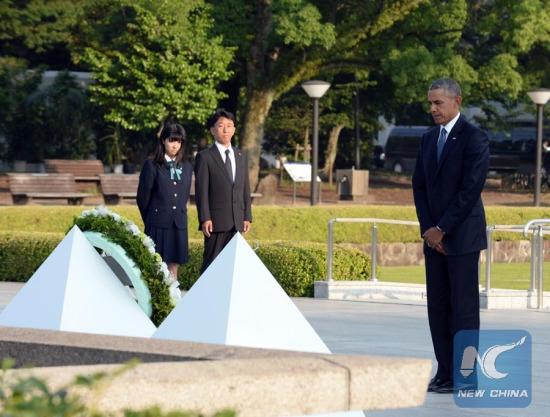
U.S. President Barack Obama (R) stands in silent tribute in front of the cenotaph during his visit to the Hiroshima Peace Memorial Park in Hiroshima, Japan on May 27, 2016. (Xinhua Photo by Ma Ping)
Barack Obama on Friday became the first incumbent U.S. president to visit Hiroshima since America dropped an atomic bomb on the city 71 years ago, stirring mixed feelings among the United States, Japan and the victim countries during WWII.
After laying a wreath at the Hiroshima Peace Memorial, Obama called for a "world without nuclear weapons" during his speech at the city's Peace Memorial Park.
"We come to ponder the terrible forces unleashed in the not so distant past. We come to mourn the dead ... their souls speak to us and ask us to look inward," Obama said, avoiding any direct expression of remorse or apology for the bombings.
Japanese Prime Minister Shinzo Abe, for his part, said that Obama's Hiroshima visit brought hope to people seeking a nuke-free world and never again should A-bomb tragedies occur.
Obama, accompanied by Abe, also visited the Peace Memorial Museum, which displays a number of artifacts of the victims and other exhibits related to the attack and talked briefly with two survivors of the atomic bomb.
Though the White House stressed before the trip that Obama won't apologize for the atomic bombing, many Japanese people still view his visit as an "apology."
"Whether he apologizes or not, the trip speaks for itself," a Tokyo resident told Xinhua.
Just hours ahead of Obama's visit, dozens of Japanese citizens gathered near the Hiroshima Peace Memorial Park, protesting against Obama's visit to Hiroshima. While holding banners that read "Get rid of all nukes immediately," "Remove all U.S. bases from Okinawa" and "We won't let you use military alliances to start your next war," protesters also shouted "You're not welcome here, Obama and Abe" and "Get out of Hiroshima."
Obama's Hiroshima visit also drew domestic criticism with the New York Post calling it a "shameful apology tour." The newspaper said "his penchant for apologizing is central to his legacy."
Hiroshima University student Morita Hirotaka said during an interview with Xinhua that with the end of his last president term in office approaching, Obama hoped to leave behind some political legacy. "It is unbearable that both Abe and Obama are making political use of Hiroshima," Hirotaka said.
The United States dropped an atomic bomb over Hiroshima, a stronghold of Japanese Imperial Army and weapons arsenal in 1945, to accelerate the end of WWII which was partially waged by Japan.
The Japanese government frequently uses Hiroshima to pose itself as a victim of the war but seldom mentions its own wartime atrocities in its war of aggression against its Asian neighbors.
Chinese Foreign Minister Wang Yi told reporters in Beijing on Friday that "It is worth paying attention to Hiroshima, but Nanjing should not be forgotten."
"Victims deserve sympathy, but perpetrators can never shirk their responsibility," Wang said.


















































